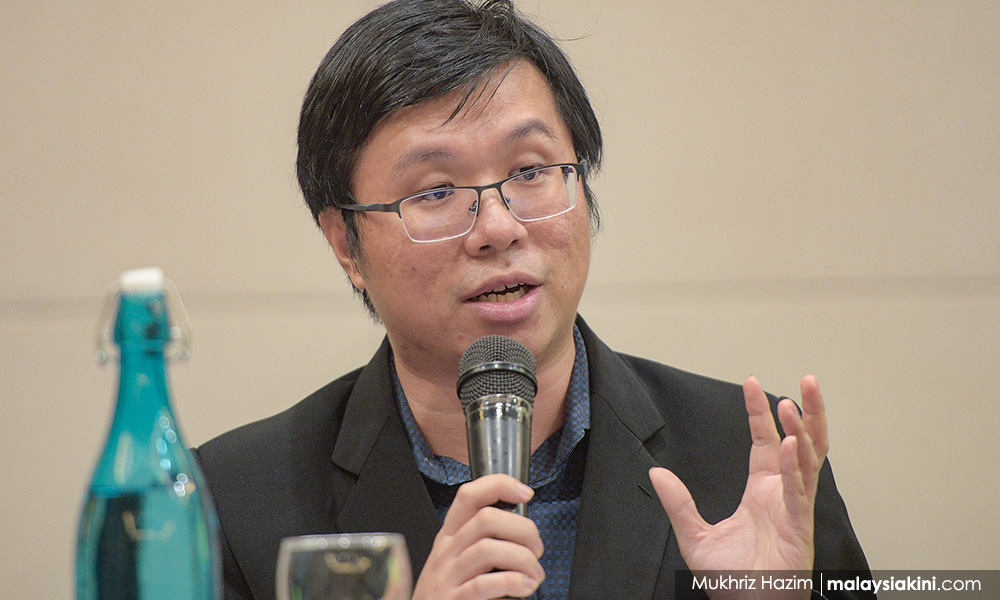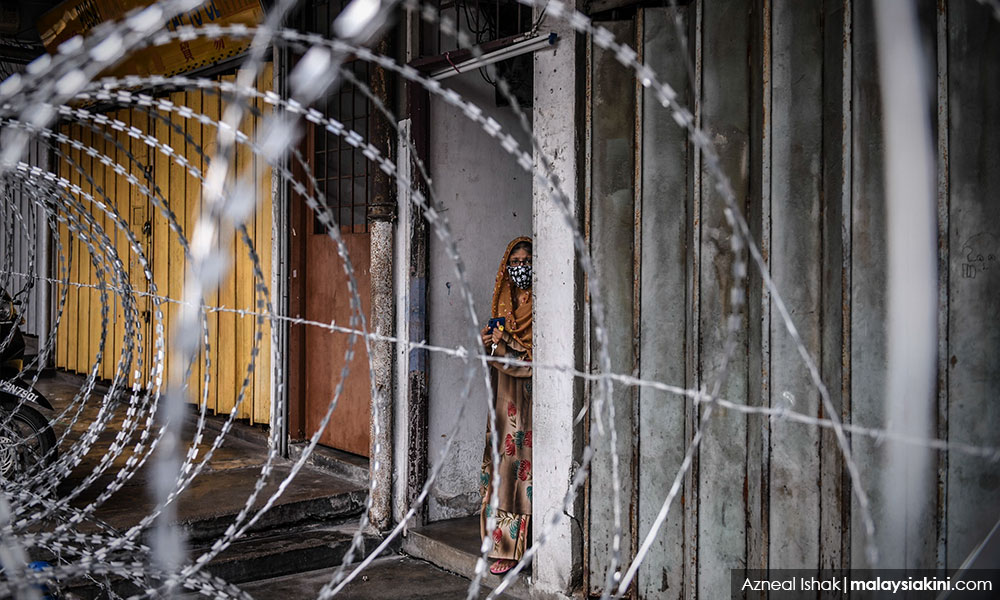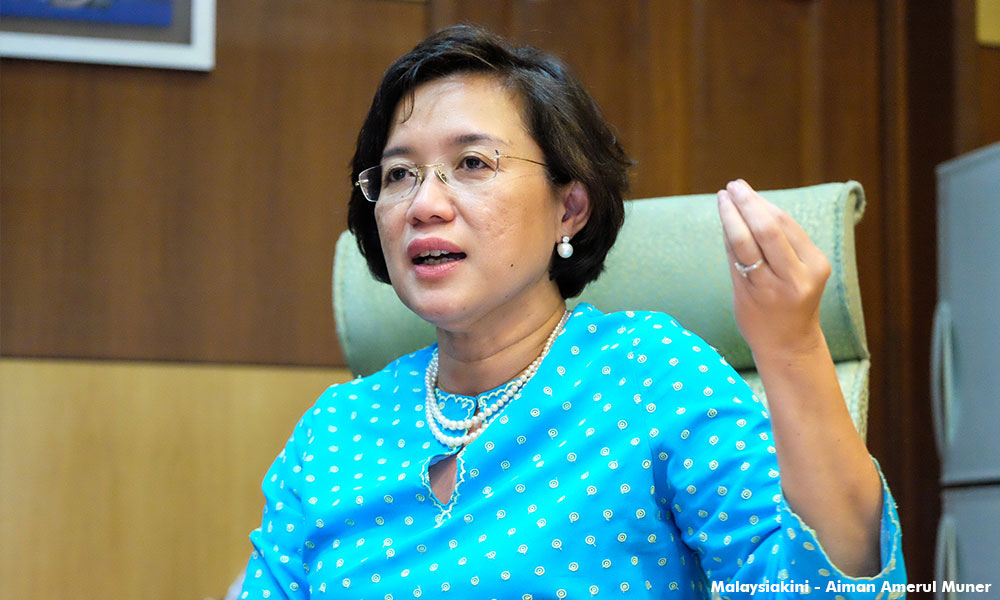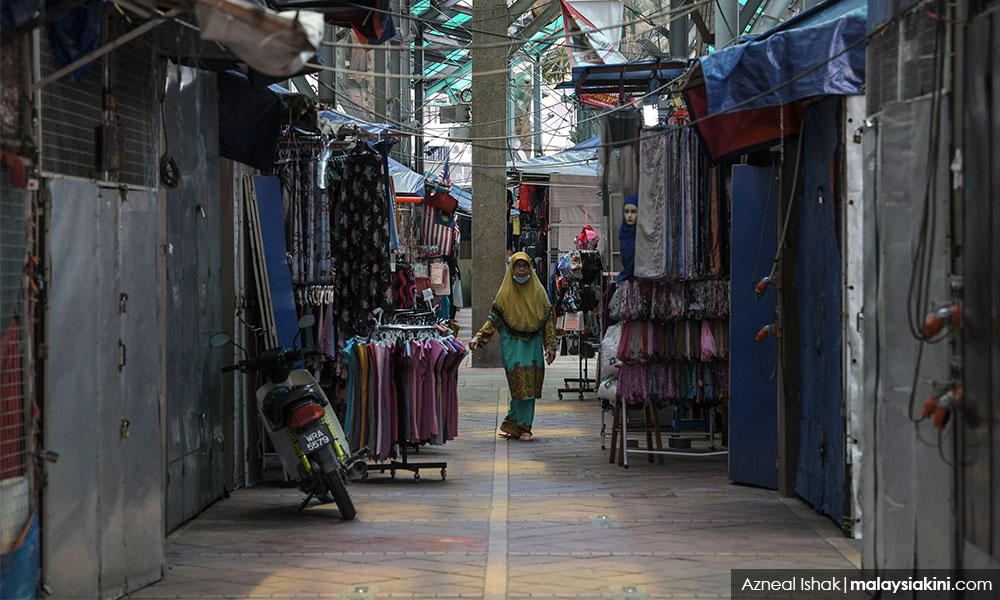Health experts have agreed with health director-general Dr Noor Hisham Abdullah’s proposal for an imminent targeted movement control order (MCO) in areas with high numbers of Covid-19 infections.
Like the top official, they say the strategy will help bring daily new case numbers down to a more manageable level.
However, the experts have also implored the government to widen data-driven targeted testing and ban social gatherings so that the lockdown and its subsequent economic carnage can be as limited as possible.
Malaysia hit a record high of 3,027 daily new infections on Thursday with Johor and the Klang Valley (Selangor and Kuala Lumpur) accounting for a bulk of the cases. Active cases now total 25,742 nationwide.
New cases dipped below 3,000 yesterday but the past 24 hours saw a record 16 deaths, nine of them in Selangor.
Why lockdowns work
Speaking to Malaysiakini, health economist Lim Chee Han agreed with the use of a targeted MCO to contain red zones - areas that have recorded 41 or more infections over the past 14 days.

The Third World Network public health researcher explained how restricting movement could break the chain of community transmissions.
This, in turn, can help lessen the strain on the healthcare system - said to be on the verge of a breakdown.
“Reducing the number of people going out would certainly mean reducing people’s interaction, and hence the probability of contracting the virus [...]
“The government can focus on the 64 red zone districts first and definitely reimpose restrictions on cross-state or cross-district movement.
“This is so the Health Ministry can have fewer worries about the probability of residents in red zones spreading the virus further and be able to focus on reducing local transmissions,” he said.
Restrictions on interstate and interdistrict travel were lifted on Dec 7. Interstate travel and social activities like sports have since led to at least 14 new Covid-19 clusters.

Monash University Malaysia public health and health systems researcher Mark Cheong similarly agreed that targeted lockdowns would buy time for the overstressed healthcare system to recover.
However, he stressed that testing and contact tracing needed to be enhanced as well.
“With the mass testing of people within an area under a targeted MCO, we will then be able to find people who are infected more easily and isolate them for treatment as well as track down and test the people whom they have had close contact with.
“If this can be done swiftly and comprehensively while the targeted MCO is in effect, then there is a good chance of reducing the spread of the virus and allowing it to burn out in that area,” Cheong explained.
Some Covid-19 patients in the Klang Valley previously told Malaysiakini that they had yet to receive a call from the ministry’s contact tracers even after being discharged.
Former deputy health minister Dr Lee Boon Chye has since called upon the ministry to employ 10,000 youths as contact tracers to ensure close contacts can be identified within 48 hours of someone testing positive.
Balancing act
For infectious diseases expert Dr Adeeba Kamarulzaman, data transparency was instrumental in rolling out a sophisticated, targeted response that nipped the problem in the bud.

“Data is very important, detailed, granular data, so we can target and focus where the lockdowns should happen.
“We also need more community-based rapid-testing and isolation (mechanisms). We need to be more transparent with data and use data to target our response,” the University Malaya professor of medicine told Malaysiakini.
Adeeba is a member of the Selangor government’s Task Force for Covid-19 (STFC) committee.
The STFC previously criticised the Health Ministry for withholding granular Covid-19 case data. In response, Noor Hisham said the ministry needed to prevent conflicting interpretations between federal and state governments.
Meanwhile, Adeeba proposed that the government stop social gatherings in red zones but allow certain industries to continue operating.
This was one way to mitigate the MCO’s much-feared economic cost. Last March’s MCO - which saw most businesses shut down - had reportedly cost the economy RM2.4 billion per day.
“I think offices and all that can still continue but maybe those who can work from home can do so. I don’t think this lockdown means everybody needs to stay at home.
“We know where the high-risk areas are,” she said.

Specifically, she suggested that fitness centres be closed while mass feasts and dining-in at eateries not be allowed.
Many gyms and restaurants have seen cases following the rise in Covid-19 infections in the Klang Valley.
For businesses affected by a targeted MCO, Cheong proposed the government give them financial support.
“We have to figure out what businesses, employers and households need in order to survive and stay afloat during MCO periods,” the academic said.
Beyond lockdowns
Moving forward, Adeeba stressed that Putrajaya needed to design a better pandemic strategy that did not rely on movement restrictions alone.
“We really need to have a strong national plan so that we don’t run into these cycles over and over again.
“Although the vaccine is going to come in March, by the time you vaccinate 70 percent of the population, it is going to be another year at least.
“We can't keep opening and locking down, opening and locking down,” she stressed.
She hoped the Health Ministry would expedite its plans to have Covid-19 patients with no or mild symptoms isolate themselves at home.
This would reduce the patient load on hospitals and quarantine centres.
For this to work, the ministry will need to provide self-reporting surveillance mechanisms. It already has guidelines for such patients and their housemates as below.

Meanwhile, former health minister Dzulkefly Ahmad proposed the federal government invest in pre-emptive measures to detect cases before outbreaks occur.
The STFC chairperson said such initiatives were already being carried out in Selangor through the Preventing and Detecting Outbreaks at Ignition Sites (Pois) initiative.
Pois brings government, private firms and NGOs together to conduct early, rapid and wide-scale testing for workers, especially migrant workers.
It also provides Covid-19 related health education for workers.
“l would press on the urgent need to institute preemptive and proactive measures, nip in the bud sort of programmes,” said the Kuala Selangor MP.
Prime Minister Muhyiddin Yassin is scheduled to make an announcement about stricter Covid-19 rules on Monday (Jan 11).
According to Defence Minister Ismail Sabri Yaakob, the government is still deliberating changes to social and movement restrictions following disagreements between ministries. - Mkini




No comments:
Post a Comment
Note: Only a member of this blog may post a comment.